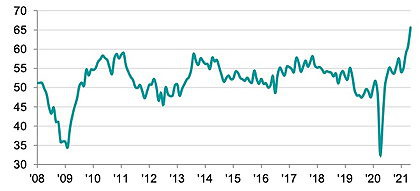Output, orders, prices and staffing all hit record highs in May

Conditions in the UK manufacturing sector improved at an unprecedented pace in May, as output growth strengthened and new orders rose at the fastest pace in the near three-decade history of the IHS Markit/CIPS PMI (Purchasing Managers’ Index). Production, staffing levels, business sentiment and export orders all hit record or near-record rates.
But backlogs in work also rose at the fastest rate in the PMI’s history, while shortages of raw materials and supply-chain disruption led to the sharpest rise in purchasing costs since the survey began in January 1992. This led manufacturers to raise selling prices, with the rate of inflation hitting a survey record.
The seasonally adjusted PMI rose to 65.6 in May, up from 60.9 in April, exceeding the previous record high of 61.0, set in July 1994. The PMI has risen in each of the past 12 months.
Manufacturing production expanded at one of the quickest rates in the PMI’s history, bettered only by those in August 2013 and July 1994. Underpinning the latest rises were record gains in new business, as domestic and overseas demand continued to revive.
New export orders rose at a survey-record pace in May, with stronger demand from the EU, the US and China. But the beneficiaries were mainly larger companies, with the rate of increase at small firms being “comparatively mild”.
The backlog in work was a major factor in a recruitment surge among manufacturers, resulting in a record increase in staffing levels.
But the average time taken to deliver inputs to manufacturers lengthened to one of the greatest extents in the survey’s history. This was linked to shortages (especially in electronics, plastics and metals), transport delays and a higher demand for raw materials.
Manufacturers’ efforts to minimise the impact of supply-chain disruption led to a record increase in purchasing activity during May. Rising production needs, building-up safety stocks and guarding against further price rises also contributed to an increase in input buying volumes. Inventories of purchases also rose, but stocks of finished goods fell as firms used inventories to help meet sales.
May saw business sentiment hit its highest level since data was first collected in July 2012. More than 70% of companies predicted that production would be higher in one year's time, compared to only 3% expecting a decline.
“The UK PMI surged to an unprecedented high in May, as record growth of new orders and employment supported one of the steepest increases in production volumes in the near 30-year survey history,” comments IHS Markit director, Rob Dobson. “Growth is being boosted by the unlocking of economies from Covid restrictions and ongoing vaccination programmes. This is being felt across the globe, as highlighted by a record rise in new export business during the latest survey month.

“The corollaries of this strong upsurge in industrial activity are increased strain on supply chains and a build-up of price pressures,” he adds. “Supplies of inputs into manufacturers and finished goods on to clients are both being severely disrupted by raw material shortages, port issues, Covid restrictions, post-Brexit difficulties and market forces as demand outstrips supply. Suppliers’ delivery times subsequently lengthened to one of the greatest extents on record, while input costs and selling prices both rose at unprecedented rates. With little sign of supply pressures receding, these price rises will become more visible to consumers.”
“An easing of restrictions and a robust vaccination strategy have unlocked the shackles placed on household and business demand over the last year, with manufacturers reporting strong growth and high levels of confidence,” comments Fhaheen Khan, senior economist at the manufacturers’ organisation, Make UK. “The few businesses that have failed to grow were mainly restricted by limited supply of materials rather than a limited market which bodes well for industry down the line once restrictions fully ease. However, there are some sectors, such as aerospace, that are still seeing very difficult conditions and are going to take some time to fully recover.
“Not everything in the garden is rosy as manufacturers are continuing to report concerns over increasing cost pressures due to supply shortages, freight costs, shipping delays and rising wages that are progressively impacting price levels over time,” she adds. “If this is to continue then consumers should be wary of significant inflation on the horizon.”
Duncan Brock, group director at the Chartered Institute of Procurement & Supply, describes May as “a month of survey records, as the manufacturing sector not only held its ground, but increased its share of productivity for the UK economy with higher levels of orders, job creation and optimism.
“Leading the way to this growth was continuing strong domestic demand, but the level of export orders was a high point with a return from European, US and Far Eastern customers growing pipelines at the highest levels since at least 1996. The ongoing boost in job numbers was an attempt to build capacity to meet this surge as backlogs increased steeply and delivery times grew to unsustainable levels, pulling back on further progress in fulfilling orders.
“The march of the makers has turned into a sprint as the blocks of lockdowns have been removed, but we haven’t seen this level of price inflation on materials for decades,” Brock continues. “Supply chain managers anticipate a continuing squeeze on deliveries and are forward buying and building stocks, so we may not have seen price peak yet. This means bigger inflationary pressures for the wider economy and the country’s place in international trade as prices charged also rose at record rates.”
IHS Markit: Twitter LinkedIn Facebook
CIPS: Twitter LinkedIn Facebook





